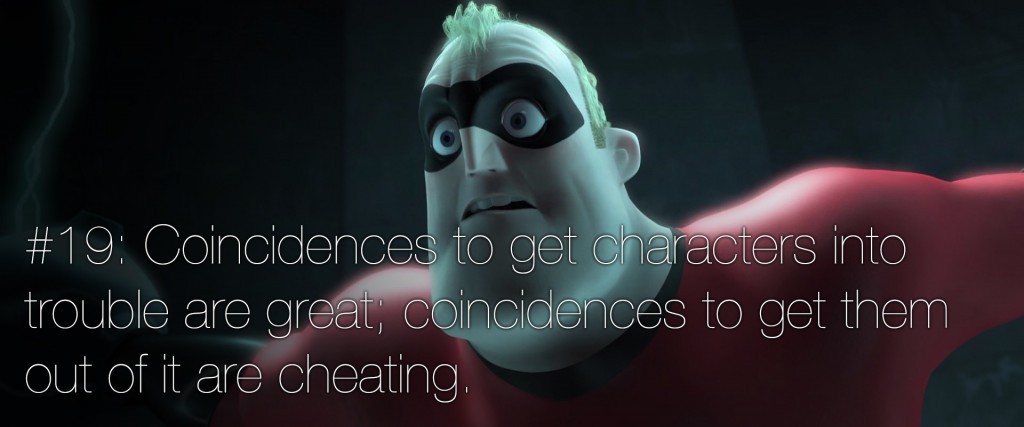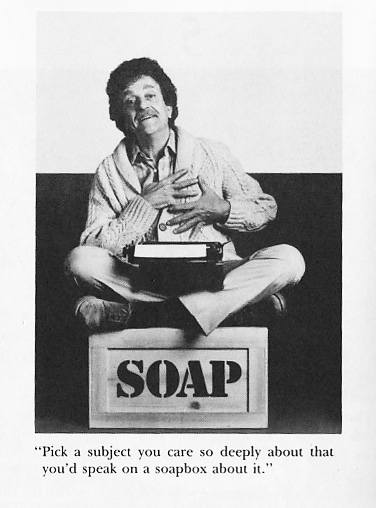Continuing my efforts to compile as many helpful writing tips as possible, here’s a resource post about writing and storytelling advice written by people far more experienced than me. Go forth, read what they’ve written, and grow!
Elmore Leonard’s 10 Rules of Writing
I love Elmore Leonard’s writing for his efficiency and I love his rules of writing for the same reason. Much as I love how verbose Boyd Crowder is on Justified—one of my favorite shows, which is based on characters created by Leonard—what makes Leonard great is how much personality he brings to every scenario by describing what is happening and by what his characters are saying. His writing is direct. It clips along with no-nonsense sentences, each one a bread crumb making you want the next one down the path on which he’s leading you. It feels almost surgical. He strikes with purpose, with scalpel-like precision, not smashing into lengthy paragraphs like some writer’s sledgehammer. I think all ten of his rules are damn near perfect and, like he says, unless you have the talent and skill of someone like Margaret Atwood, follow them.
My favorite bits…
“A prologue in a novel is backstory, and you can drop it in anywhere you want.”
“Never use a verb other than “said” to carry dialogue. The line of dialogue belongs to the character; the verb is the writer sticking his nose in.”
“Use regional dialect, patois, sparingly. Once you start spelling words in dialogue phonetically and loading the page with apostrophes, you won’t be able to stop.”
“If it sounds like writing, I rewrite it.”
[Hat tip to Randy Stradley for the link to BrainPickings!]
And speaking of Margaret Atwood, a writer of whom I’m incredibly in awe for her ability to drop prologue in anywhere in the most intriguing ways…
Margaret Atwood’s 10 Rules of Writing
Atwood’s writing is so personal, poetic, and dense that she can make you so intimately knowledgeable of a character’s habits and daily life that it feels like your own by the time she reveals the first big world building nugget 20 pages into the story. By the time the other shoe drops on the world building 30 pages later, you’ve become the character. She’s that good. Her rules contain some silliness, but I love #7 through #9.
My favorite bits…
“You most likely need a thesaurus, a rudimentary grammar book, and a grip on reality.”
“Nobody is making you do this: you chose it, so don’t whine.”
“You can never read your own book with the innocent anticipation that comes with that first delicious page of a new book, because you wrote the thing… Therefore ask a reading friend or two to look at it before you give it to anyone in the publishing business.”
“If you’re lost in the plot or blocked, retrace your steps to where you went wrong.”
Pixar’s 22 Rules of Storytelling
While Leonard’s and Atwood’s lists both have humor and one-off rules alongside some indispensable tips, Pixar’s list of rules is easily the most user friendly for writers of all skill levels. It’s a list of, essentially, questions that you—as the writer or storyteller—should be asking yourself along the way. Read the rule, apply it to your story. Does what you wrote jibe with the rule? If not, it’s probably best to rewrite. You may know better than Pixar, but I doubt it.
My favorites…
#1, #3, #5, #6, #7, #16, #17, and, as a writer and especially as an editor, definitely definitely definitely #19.

Neil Gaiman’s 8 Rules of Writing
I stumbled upon Mr. Gaiman’s rules on tumblr recently and, low and behold, Brain Pickings had them listed there, as well. Which, if you haven’t clicked one of these links already, you’re missing tips from more great writers than I’ll list here. So, click through, me hearties! Anywho… As probably the most successful example of a writer who broke out in comics, and is as well known for his sequential work as his prose, Gaiman’s rules are good ones for folks interested in writing for more than one medium. While #8 makes me wary, as I think notes, feedback, and constructive criticism are crucial (“Said the editor…”), I do love this part: “Write it honestly, and tell it as best you can.”
Other great nuggets…
“Finish what you’re writing. Whatever you have to do to finish it, finish it.”
“Show it to friends whose opinion you respect and who like the kind of thing that this is.”
“Perfection is like chasing the horizon. Keep moving.”
I’ll end with…
Kurt Vonnegut’s 8 Keys to the Power of the Written Word
After reading Slaughterhouse Five in my youth, Kurt Vonnegut became my first favorite writer. So, aside from being an incredible and legendary talent, his advice is a “must have” on this catch-all post of great tips.
My favorite parts…
“The most damning revelation you can make about yourself is that you do not know what is interesting and what is not.”
“I am not urging you to write a novel, by the way — although I would not be sorry if you wrote one, provided you genuinely cared about something.”
“Simplicity of language is not only reputable, but perhaps even sacred.”
“If a sentence, no matter how excellent, does not illuminate your subject in some new and useful way, scratch it out.”
“I myself find that I trust my own writing most, and others seem to trust it most, too, when I sound most like a person from Indianapolis, which is what I am. What alternatives do I have?”
“Our audience requires us to be sympathetic and patient teachers, ever willing to simplify and clarify, whereas we would rather soar high above the crowd, singing like nightingales.”
Good stuff, all of it.
Finally, after reading all these lists and compiling them for this post, here’s my one piece of advice: Until you’re as good as Leonard, Atwood, Gaiman, or Vonnegut, it won’t hurt you to take these rules to heart and refer back to them regularly. I’m sure you’re thinking to yourself, “Plenty of good writers don’t follow all these rules!” And you’re right, plenty of them don’t. But, if eight to ten rules work for these greats, then you might just need to follow all 58 listed at the above links until you’re one of the greats. You could do worse.
[A bunch more of these on Brain Pickings. Check them all out here!]


